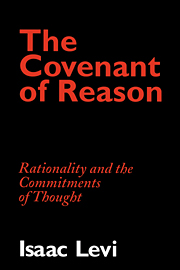Book contents
- Frontmatter
- Contents
- Introduction
- 1 Rationality and commitment
- 2 Rationality, prediction, and autonomous choice
- 3 The logic of full belief
- 4 Consequentialism and sequential choice
- 5 Prediction, deliberation, and correlated equilibrium
- 6 On indeterminate probabilities
- 7 Consensus as shared agreement and outcome of inquiry
- 8 Compromising Bayesianism: A plea for indeterminacy
- 9 Pareto unanimity and consensus
- 10 The paradoxes of Allais and Ellsberg
- 11 Conflict and inquiry
- 12 The ethics of controversy
- Name Index
- Subject Index
6 - On indeterminate probabilities
Published online by Cambridge University Press: 05 June 2012
- Frontmatter
- Contents
- Introduction
- 1 Rationality and commitment
- 2 Rationality, prediction, and autonomous choice
- 3 The logic of full belief
- 4 Consequentialism and sequential choice
- 5 Prediction, deliberation, and correlated equilibrium
- 6 On indeterminate probabilities
- 7 Consensus as shared agreement and outcome of inquiry
- 8 Compromising Bayesianism: A plea for indeterminacy
- 9 Pareto unanimity and consensus
- 10 The paradoxes of Allais and Ellsberg
- 11 Conflict and inquiry
- 12 The ethics of controversy
- Name Index
- Subject Index
Summary
Some men disclaim certainty about anything. I am certain that they deceive themselves. Be that as it may, only the arrogant and foolish maintain that they are certain about everything. It is appropriate, therefore, to consider how judgments of uncertainty discriminate between hypotheses with respect to grades of uncertainty, probability, belief, or credence. Discriminations of this sort are relevant to the conduct of deliberations aimed at making choices between rival policies not only in the context of games of chance, but in moral, political, economic, or scientific decision making. If agent X wishes to promote some aim or system of values, he will (ceteris paribus) favor a policy that guarantees him against failure over a policy that does not. Where no guarantee is to be obtained, he will (or should) favor a policy that reduces the probability of failure to the greatest degree feasible. At any rate, this is so when X is engaged in deliberate decision making (as opposed to habitual or routine choice).
Two problems suggest themselves, for philosophical consideration:
The problem of rational credence: Suppose that an ideally rational agent X is committed at time t to adopting as certain a given system of sentences KX,t (in a suitably regimented L) and to assigning to sentences in L that are not in Kxt, various degrees of (personal) probability, belief, or credence. The problem is to specify conditions that X's “corpus of knowledge” KX,t and his “credal state” BX,t (i.e., his system of judgments of probability or credence) should satisfy in order to be reasonable. […]
- Type
- Chapter
- Information
- The Covenant of ReasonRationality and the Commitments of Thought, pp. 117 - 144Publisher: Cambridge University PressPrint publication year: 1997



